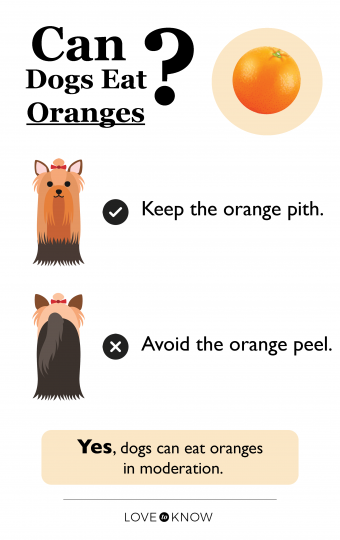
Oranges are safe for dogs to consume, although many don't care for the citrus taste. If you think your dog would enjoy oranges, there are both benefits to consider and precautions to take when feeding this fruit.

Benefits of Oranges
It's well-known that oranges are an excellent source of vitamin C. Although dogs do produce vitamin C on their own, adding a small amount to their diet can be beneficial, especially for dogs with conditions that do not allow their bodies to provide a sufficient amount. Dogs with metabolic conditions may get an immune boost with a small amount of orange added to their diet.
Oranges are also a great source of dietary fiber, which improves their digestive health and helps them to stay full longer. The fiber in the orange also prevents fast absorption of the natural sugars.
Dietary fiber also makes the orange an ideal choice for dogs who are overweight or obese. A small portion can provide a tasty treat without adding too many calories or too much sugar to their diet. Oranges are also high in:
- Potassium
- Thiamine
- Folate
The orange pith, which is that white substance that's between the peel and the flesh of the orange, is rich in dietary fiber and antioxidants, so there's no need to remove it. It's also low in sugars and oils, which reduces the risk that it will cause digestive upset. The pith is actually the most nutritionally beneficial part of the orange.
What to Avoid
Oranges do contain a significant amount of sugar content, which can result in stomach upset if your dog consumes too much. If you notice any symptoms of discomfort, skip the oranges and move on to a different type of treat their body will accept.
The orange peel isn't toxic to dogs, but it can result in an obstruction in the digestive tract if consumed. It's best to keep oranges out of reach of your dog unless you're providing them the flesh as an occasional treat.
Orange juice is also not recommended. Due to the amount of sugar and oils found in oranges, even natural orange juice could cause digestive upset. Commercial varieties are highly advised against due to not only the sugar content, but the additives found within.
How Much Orange Can Dogs Eat
Your dog should be limited to one or two orange segments on an occasional basis. Smaller dogs should have a smaller quantity. Puppies can also eat oranges, but they are more prone to stomach upset from any food item than are adult dogs. Providing a very small amount, like 1/4 of a segment, is recommended if your pup wants to give oranges a try.
How to Prepare
Peel the orange, ensuring you don't have any pieces of the exterior skin on the orange flesh. Provide one or two segments only to medium or large breed dogs. Smaller dogs should have less than other breeds. A quarter or half of a segment is sufficient.
As with any other food, provide only a small piece, perhaps a quarter of a segment prior to feeding more and observe for adverse reactions. If, after 24 hours, your dog doesn't have any type of stomach upset or allergic reaction, you can then continue providing the segments.

To avoid consuming the seeds, navel oranges are the best to try first. If you are considering other orange types, be sure to remove both the seeds and the peel.
You can also make your own orange and cranberry dog treats, which will provide your dog with a tasty immune boost. Or, you can choose treats that combine pumpkin and orange for a boost to their digestive health.
Feed Oranges in Moderation
As with any other fruit, it's important to feed oranges in moderation. Moderation is the key to providing and maximizing benefits while limiting the risks and drawbacks. If you are unsure if you should feed your dog oranges, or your dog has an underlying medical condition, contact your family or holistic veterinarian for advice.







